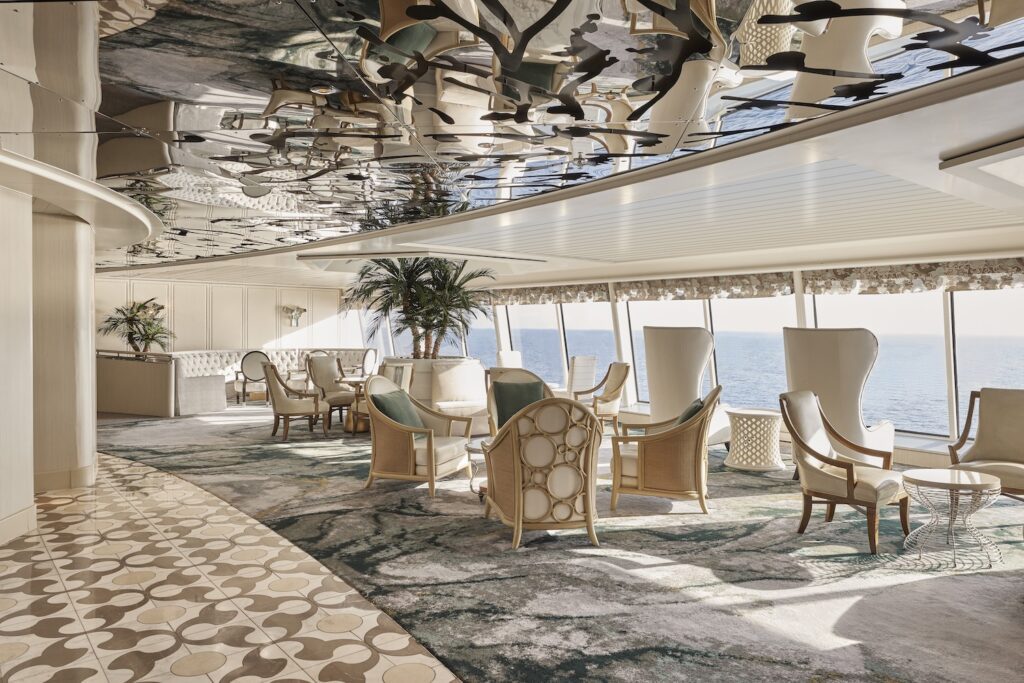Morocco is a world of wonders.
Entertainers and sellers, jingly arms displaying silver bangles, kaftans flapping their full colours, and a fusion of aromatic food stalls set an enticing scene in the country’s fourth largest city, Marrakesh.
I stepped over woven rugs and enamelled tagines stacked high while acrobats cartwheeled around me. A monkey perched on a man’s head. A piercing shrill proclaimed the tradition of snake charmers hissing incantations. This place has seen the slaughter of animals and punishment of criminals and is a place where the caravan of camels made their stop from the journey across Africa.
It was chaos, bedlam, a cacophony wrapped in the character and colour one expects to find and comes for in the Marrakesh medina’s main square, Jemaa el-Fnaa.
I had joined a Riviera Travel escorted tour to Marrakesh and the Atlas Mountains. There were 40 of us in total. Friends, couples and solo travellers on a six-day immersive jouney culture, with a considerate guide who sheparded us through tips on attire, etiquette, and daily life in the magical place called Morocco.

Snake charmers on Marrakesh’s Jemaa el-Fnaa square (photo courtesy of Visit Marrakesh)
The Medina
The word medina comes from the Arabic word madīnah, which means “town” or “city” and is often a historical district and walled city.
Weaving through arched passages, we dove deep into Marrakesh’s, through chunky wooden doors studded with metal. The lilting sounds of a reed flute from somewhere deep inside travelled with us. We brushed shoulders with women in kaftans, men in striped djellabas and some in tasselled Tommy Cooper-styled hats. Dusty dnaced in the sunlight beaming through a gap in the decaying alleyways.
“I give good price nice lady.” It’s a phrase I heard repeatedly.
Five times a day, I also heard the hypnotic voice of the muezzin calling the faithful to prayer from the Koutoubia Mosque, the largest in Marrakesh. The mosque’s minaret has been standing guard over the old city since the 12th century and is Marrakesh’s most famous landmark. We took a seat at one of the terraced restaurants for a drink to toast the sunset as it lowered behind the mosque—an unforgettable sight.
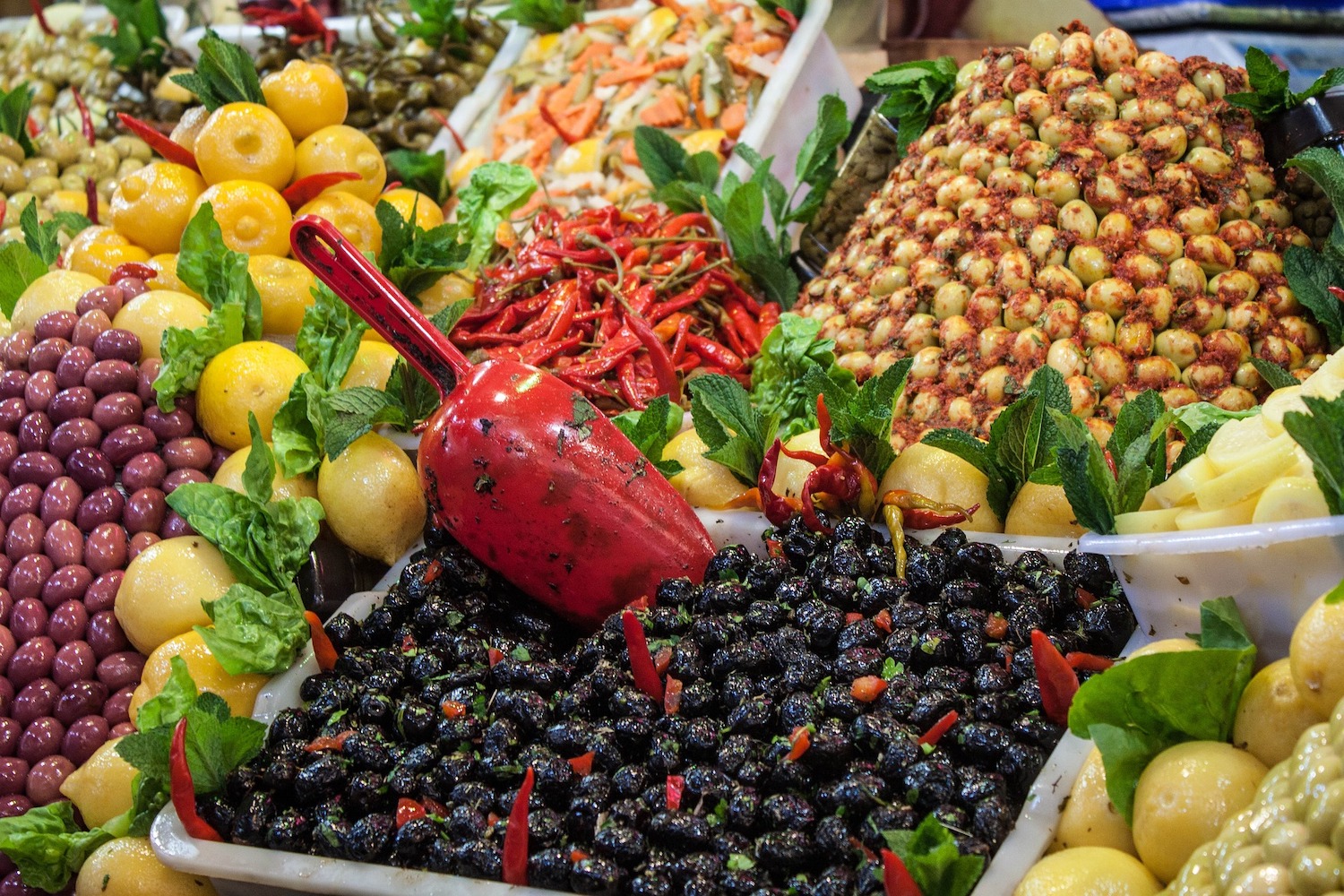
The Marrakesh medina is filled with delights and delectables (photo from Pixabay)
Botanical Garden & Palm Trees
From chaos to calm, our tour continued to the fashionable Majorelle Garden, celebrating 100 years in 2024. Enclosed by walls with pathways of cacti and bamboo, it felt small and exclusive, tranquil and peaceful.
French painter Jacques Majorelle created this garden as a sanctuary and botanical ‘laboratory’.
In 1980, Yves Saint Laurent and Pierre Bergé purchased it. Unsurprisingly, this is close to the wealthy Palmeraie area with its chichi villas and golf courses that attract the likes of the Beckhams and the Clintons. Situated at the edge of the city’s northern section, this is Marrakech’s oasis of 100,000 palm trees.

The Saadian Tombs date to the 16th century and are a UNESCO World Heritage site (photo by Jane Wilson)
Palace Pleasers
Our excursions took us into the extensive Saadian Tombs, a royal necropolis and now UNESCO World Heritage site built in the 16th century by Sultan Ahmad al-Mansur, the third ruler of the Saadian dynasty. Constructed to honour the sultan’s ancestors, the palace offers visitors a grandiose display of his power and wealth, art and architecture.
The Bahia Palace, was intended to be the greatest palace of its time. It’s name in Arabic meaning “brilliance”, it was intended to capture the essence of the Islamic and Moroccan style. When Morocco gained independence from France in 1956, the Bahia palace was used as a royal residence, until King Hassan II transferred it to the custody of the Moroccan Ministry of Culture, so the building could serve as a cultural icon and tourist attraction.
El Badi Palace was designed as a showcase of luxury, featuring Italian marble, gold leaf from Sudan, and onyx from India, decorated with intricate mosaics, marble columns, and ornate carvings. The palace was also home to the Sultan’s harem, which included over 500 women.
Gastronomic Delights
An optional experience on our tour was a cookery course at La Maison Arabe Restaurant where we prepared a chicken tagine with all the equipment and ingredients laid out.
I lifted the conical lid of our tagine and it released the inviting aroma of warm onions and turmeric blended with chicken thighs, ginger, cinnamon and saffron threads, simmering before the finale of a caramelised apricot topping.
We sipped saffron tea then tucked into our kitchen creations to compare our tagines with those served in other restaurants where we enjoyed authentic Moroccan dishes including at Dar Zellij and Dar Moha.

Tagine cooking is a Moroccan staple
The High Atlas Mountains
Packed with culture, history, and fun, this six-day mid-haul escorted tour included guided excursions each day.
There was a mint tea ceremony with Fatma in her traditional house tucked away in the High Atlas Mountains with homemade bread, honey, oil and freshly made butter. I was surprised to learn that 60 percent of Moroccans are Berbers, the indigenous people of North Africa, and this half-day tour gave us a peep into their traditional, simple way of life.
During the 50-minute coach drive, we watched landscapes transform from sun-scorched deserts to snow-covered mountains with the highest peak in the distance rising at 4,167 metres. We witnessed dry river beds, rural villages like mini Lego pieces tucked into deep valleys and huddles of irrigated trees and blossoming groves.
And we passed a sign saying “Handmade Wellness.” This is where the city people escape the heat into the mountain villages, to laze across coloured cushions by the meandering river.
We did too.
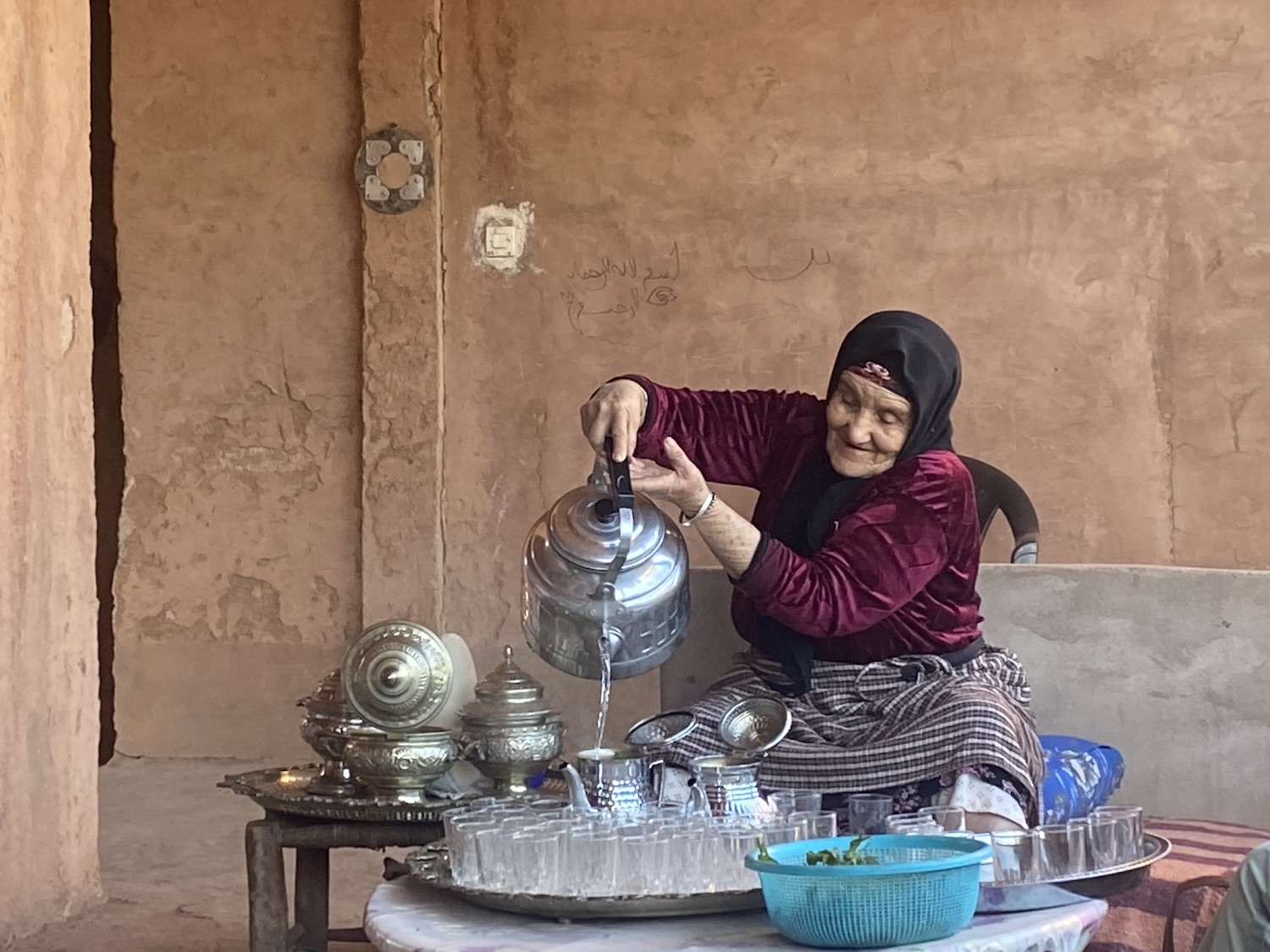
Enjoying Moroccan tea, expertly prepared (photo by Jane Wilson)
Essaouira
The full-day excursion to this 15th-century coastal port town was three hours each way by coach. Passing orange groves and camels (one hump and two), we stopped to support the Afous Women’s Cooperative, set up by the government to help women in rural areas become independent.
We were welcomed with high-pitched traditional ululation greetings sealed with genuine smiles before watching a demonstration of the handmade production of the versatile and beneficial Argan oil, known here as liquid gold. This area is one of only three places in the sub-Saharan region of Morocco where the trees grow thanks to the composition of the soil. Depending on the way it’s made, the oil can be used for cosmetic or culinary purposes.
Culinary Argan oil helps lower cholesterol while cosmetic Argan oil hydrates the skin and is scented with orange blossom, it smells amazing.
Essaouria is a harbour town on the Atlantic coast, with a medina, (old town), protected by 18th-century seafront ramparts. It gets windy so great for surfing and sailing but buffeted by three kilometres of beach and good fish restaurants, naturally.
The narrow passageways overflow with wooden carvings laid on rugs, tagine dishes by the dozen, shaded by hanging carpets. It’s an arty place with a hippy scene so don’t be surprised to hear Bob Marley renditions in the main square.
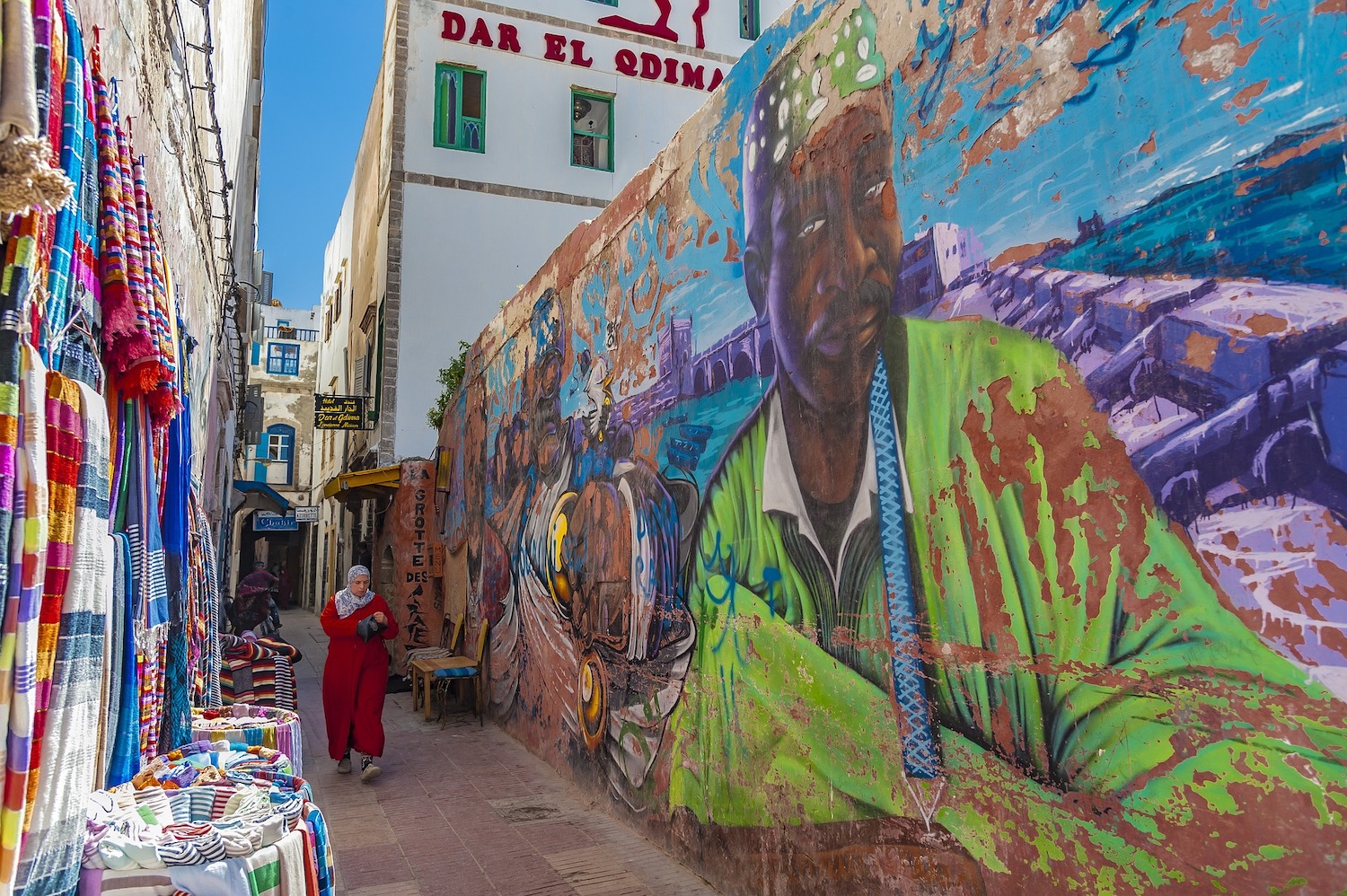
Essaouria, Morocco, is a harbour town on the Atlantic coast with a Medina full of narrow passageways (photo from Pixabay)
And… Relax
With time to relax in the afternoon except on the full excursion day, there was time to experience a traditional Hammam in the hotel’s Spa.
Dark and atmospheric, the ritual included a body cleanse on a slab of marble followed by time in a steam room, then exfoliation with the local black soap and then a full relaxing massage with the reputable Argan Oil– bliss, Moroccan-style.
The hotel’s spa has a menu of massages, facials, hand and foot treatments, and two Hammams offering the traditional ritual.
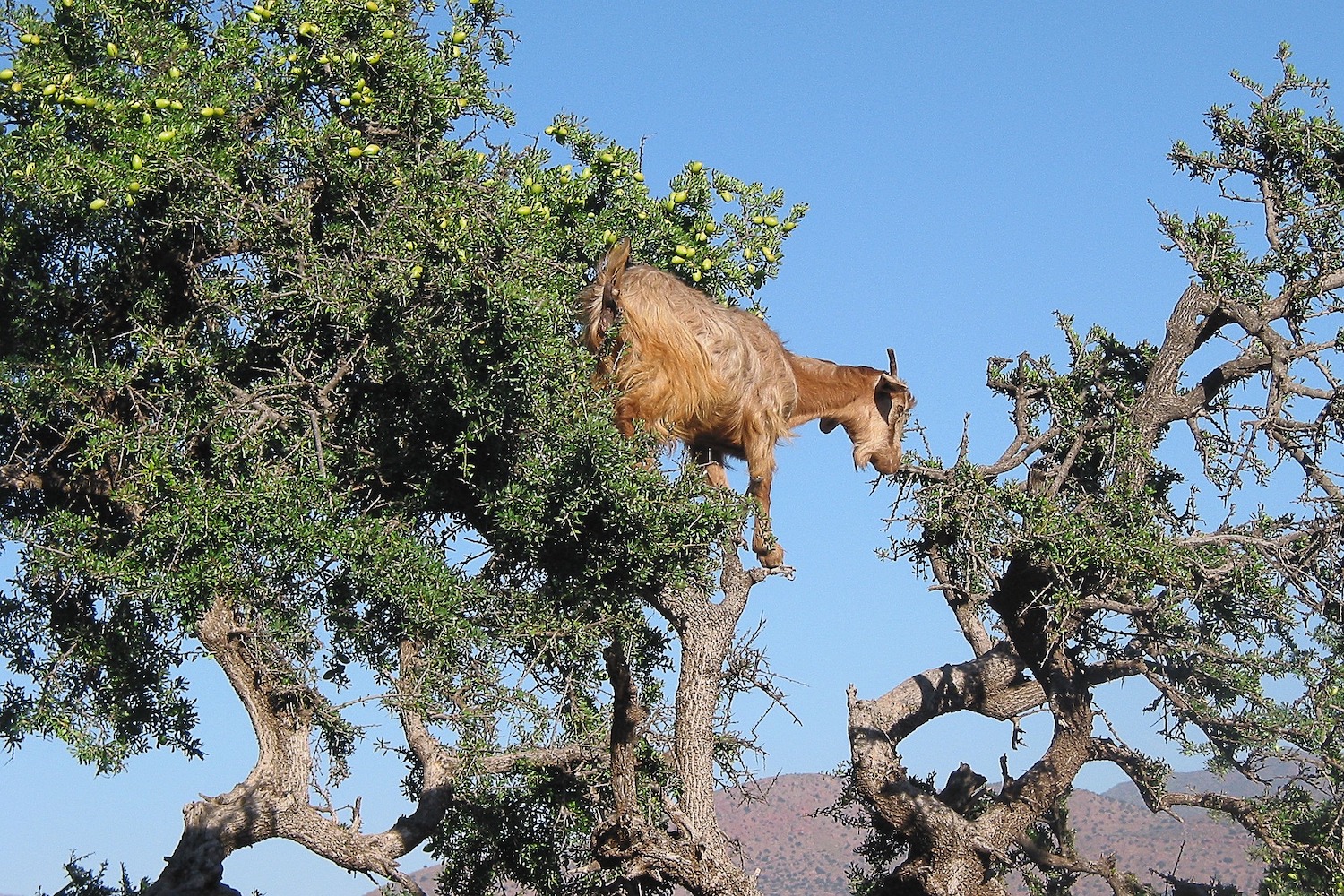
The argan tree is known for the many health benefits it brings, and grows only in the south-west of Morocco. Goats love the taste of argan fruit. (Photo from Pixabay)
The Hotel
We stayed at the four-star Grand Plaza Hotel with 185 guest rooms each spacious and decorated to reflect the region. Think carved arches above the bed, a frieze wall covering on one side and a spacious balcony on the other where I could soak up the views of the pool atrium within the hotel or the Theatre Royal and impressive rail station outside.
There are several bars and restaurants inside too. The pool restaurant served excellent salads and Moroccan dishes. The main restaurant serves a buffet for breakfast and dinner, which included a mix of Mediterranean and typical Moroccan dishes dining inside or al-fresco around the pool.
This was a taste of Morocco, the city of Marrakesh, the coast and the mountains under the guidance of Riviera Travel’s knowledgeable, considerate and friendly guides. It was certainly an immersion into its traditions even though I shied away from the snake charmers.
Six-day Marrakesh and The Atlas Mountains escorted tour. Visits and tours include a guided tour of Marrakesh, featuring the Saadian tombs, souks, the Jemaa el-Fnaa square, and the Jardin Majorelle Gardens; a visit to the coastal town of Essaouira; and the Atlas Mountains.
Check website for specific details, inclusions and pricing.
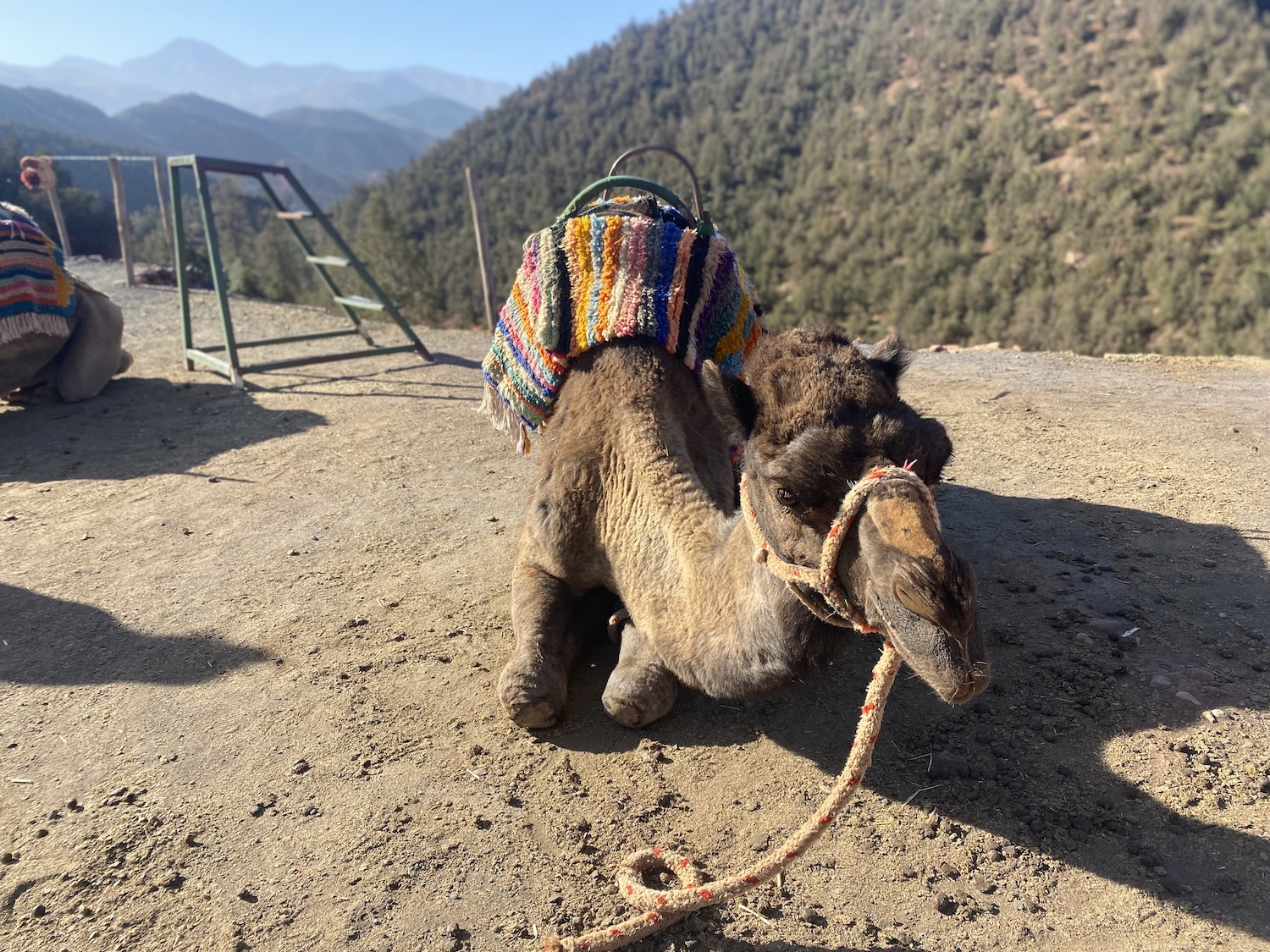
A Moroccan camel waits for a passenger (Photo by Jane Wilson)
***
BeSeeingYou In: On an Escorted Tour to Marrakesh & The Atlas Mountains
Good To Know: The Hammam in the hotel is a good value.
WOW Factor: The panoramic view over Jemaa el-Fnaa as the sun sets behind the minaret.
Tip: Haggle for items you want to buy in the markets. It’s expected.
***
Author bio: Jane Wilson, The Wellness Traveller
Find your travel muse at BeSeeingYou
Follow us on Instagram
Lead photo courtesy of Visit Marrakesh





